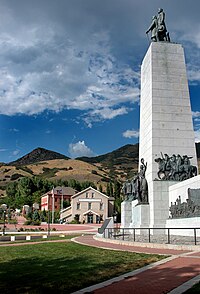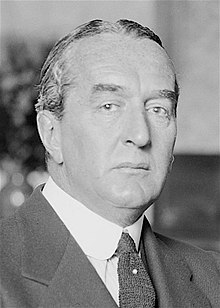Portal:History
The History Portal
History (derived from Ancient Greek ἱστορία (historía) 'inquiry; knowledge acquired by investigation') is the systematic study and documentation of the human past. History is an academic discipline which uses a narrative to describe, examine, question, and analyze past events, and investigate their patterns of cause and effect. Historians debate which narrative best explains an event, as well as the significance of different causes and effects. Historians debate the nature of history as an end in itself, and its usefulness in giving perspective on the problems of the present.
The period of events before the invention of writing systems is considered prehistory. "History" is an umbrella term comprising past events as well as the memory, discovery, collection, organization, presentation, and interpretation of these events. Historians seek knowledge of the past using historical sources such as written documents, oral accounts or traditional oral histories, art and material artifacts, and ecological markers.
Stories common to a particular culture, but not supported by external sources (such as the tales surrounding King Arthur), are usually classified as cultural heritage or legends. History differs from myth in that it is supported by verifiable evidence. However, ancient cultural influences have helped create variant interpretations of the nature of history, which have evolved over the centuries and continue to change today. The modern study of history is wide-ranging, and includes the study of specific regions and certain topical or thematic elements of historical investigation. History is taught as a part of primary and secondary education, and the academic study of history is a major discipline in universities.
Herodotus, a 5th-century BCE Greek historian, is often considered the "father of history", as one of the first historians in the Western tradition, though he has been criticized as the "father of lies". Along with his contemporary Thucydides, he helped form the foundations for the modern study of past events and societies. Their works continue to be read today, and the gap between the culture-focused Herodotus and the military-focused Thucydides remains a point of contention or approach in modern historical writing. In East Asia a state chronicle, the Spring and Autumn Annals, was reputed to date from as early as 722 BCE, though only 2nd-century BCE texts have survived. The title "father of history" has also been attributed, in their respective societies, to Sima Qian, Ibn Khaldun, and Kenneth Dike. (Full article...)
Featured picture
Did you know (auto generated)

- ... that archaeologist Lawrence H. Keeley refined the methods of microscopic use-wear analysis to learn about prehistoric stone tools?
- ... that Narita Viliamu Tahega has won 38 medals in international weightlifting competitions, the most in the history of Niue athletics?
- ... that Puerto Rico's Willie Hernández became the highest paid player in Detroit Tigers history after winning Cy Young and Most Valuable Player awards and a World Series?
- ... that Centre's 1921 defeat of Harvard is widely considered to be one of the greatest upsets in college football history?
- ... that in a copyright infringement case over a coffee-table history of the Grateful Dead, the Second Circuit held that a reuser can still claim fair use despite negotiating with the rights holder?
- ... that the 1971 Hazelwood massacre was the largest mass murder in the history of "Murder City"?

King Arthur (Welsh: Brenin Arthur, Cornish: Arthur Gernow, Breton: Roue Arzhur, French: Roi Arthur), according to legends, was a king of Britain. He is a folk hero and a central figure in the medieval literary tradition known as the Matter of Britain.
In Welsh sources, Arthur is portrayed as a leader of the post-Roman Britons in battles against the Anglo-Saxons in the late 5th and early 6th centuries. He first appears in two early medieval historical sources, the Annales Cambriae and the Historia Brittonum, but these date to 300 years after he is supposed to have lived, and most historians who study the period do not consider him a historical figure. His name also occurs in early Welsh poetic sources such as Y Gododdin. The character developed through Welsh mythology, appearing either as a great warrior defending Britain from human and supernatural enemies or as a magical figure of folklore, sometimes associated with the Welsh otherworld Annwn. (Full article...)
On this day

- 1599 – At the culmination of a Swedish civil war, supporters of the deposed King Sigismund III Vasa were publicly executed in the Åbo Bloodbath.
- 1969 – The children's television series Sesame Street (puppeteer pictured) premiered in the United States.
- 1972 – Three men hijacked Southern Airways Flight 49 and threatened to crash it into Oak Ridge National Laboratory in the U.S. state of Tennessee.
- 2006 – Nadarajah Raviraj, a prominent Sri Lankan Tamil politician and human rights lawyer, was assassinated in Colombo.
- 2009 – A skirmish occurred between South Korean and North Korean naval ships off Daecheong Island in the Yellow Sea.
- Afzal Khan (d. 1659)
- Scipione Piattoli (b. 1749)
- Andrés Manuel del Río (b. 1764)
- Elisa Leonida Zamfirescu (b. 1887)
Selected quote
Victorious warriors win first and then go to war, while defeated warriors go to war first and then seek to win.
— Sun Tzu, Ancient Chinese military strategist
Related portals
More Did you know...
- ... that the anti-religious campaign culminating in the Stalinist show trial of the Kraków Curia (pictured) led to the imprisonment of 123 Polish Roman Catholic priests in just one year?
- ... that Confederate brigadier general Alfred E. Jackson was pardoned by President Andrew Johnson because of his kindness toward Johnson's family during the Civil War?
- ... that after HMS Porcupine was nearly split in two by a torpedo, the halves were nicknamed HMS Pork and HMS Pine?
- ... that the Experiment was a boat powered by horses running on a treadmill and propelled by a then-novel type of screw propeller?
- ... that one of the highest-ranking generals in China was injured in battle nine times?
- ... that in Mesopotamian mythology, the Apkallu were sent by the god Enki, from Dilmun to teach human beings various aspects of civilization?
- ... that Karl Marx's theory of historical trajectory attempted to prove the long-term unsustainability of capitalism?
- ... that in November 1921, the schooner Cymric collided with a tram in Dublin?
Topics
Categories

History • By period • By region • By topic • By ethnic group • Historiography • Archaeology • Books • Maps • Images • Magazines • Organizations • Fictional • Museums • Pseudohistory • Stubs • Timelines • Chronology • People • Wikipedia historians
WikiProjects
![]() WikiProject History •
Ancient Near East • Australian History • Classical Greece and Rome • Dacia • Former countries • History of Canada • Chinese history • European history • Heraldry and vexillology • Indian history • Jewish history • Medieval Scotland • Mesoamerica • Military history • Middle Ages • History of Science
WikiProject History •
Ancient Near East • Australian History • Classical Greece and Rome • Dacia • Former countries • History of Canada • Chinese history • European history • Heraldry and vexillology • Indian history • Jewish history • Medieval Scotland • Mesoamerica • Military history • Middle Ages • History of Science
WikiProject Time • Days of the Year • Years
WikiProject Biography • Composers • Political figures • Saints • United States Presidents
Things you can do
 |
Here are some tasks awaiting attention:
|
Associated Wikimedia
The following Wikimedia Foundation sister projects provide more on this subject:
-
Commons
Free media repository -
Wikibooks
Free textbooks and manuals -
Wikidata
Free knowledge base -
Wikinews
Free-content news -
Wikiquote
Collection of quotations -
Wikisource
Free-content library -
Wikiversity
Free learning tools -
Wiktionary
Dictionary and thesaurus





















































